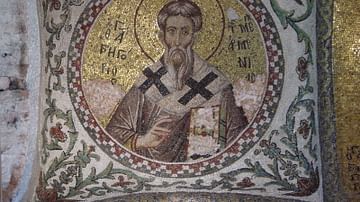Search
Search Results

Definition
New Testament
New Testament is the name for the second half of the Christian Bible, compiled from the 2nd century CE, after the separation of Christianity from Judaism. The Christian Bible retained books of the Jewish scriptures, the Old Testament, as...

Definition
Saint Gregory the Illuminator
Saint Gregory the Illuminator or Enlightener (previously known as Grigor Lusavorich, c. 239 - c. 330 CE) was the first bishop of the Armenian church, and he is widely credited with converting king Tiridates the Great to Christianity, formally...

Definition
Benito Mussolini - Founder of Fascism
Benito Mussolini (1883–1945) was the founder of fascism and dictator of Italy from 1922 to 1943. He led the country into a highly authoritarian regime and then dragged it into the Second World War (1939-45) on the side of Nazi Germany. Mussolini...

Definition
Petrarch
Petrarch (1304-1374 CE), full name Francesco Petrarca, was an Italian scholar and poet who is credited as one of the founders of the Renaissance movement in art, thought, and literature. Petrarch actively searched for 'lost' ancient manuscripts...

Definition
Continental System
The Continental System was a major blockade of British trade imposed by French Emperor Napoleon I from 21 November 1806 to 11 April 1814. It was designed to cripple the British economy, thereby forcing Britain out of the Napoleonic Wars (1803-1815...

Definition
Augustine of Hippo
Aurelius Augustinus Hipponensis (354-430), better known as Augustine of Hippo, is extolled as the greatest of the Christian Church Fathers. More than any other writer, he developed what would become known as systematic theology, or an explanation...

Definition
Investiture Controversy
The Investiture Controversy, also referred to as the Investiture Contest or Investiture Dispute, was a conflict lasting from 1076 to 1122 between the papacy of the Catholic Church and the Salian Dynasty of German monarchs who ruled the Holy...

Definition
Roman Gaul
Roman Gaul is an umbrella term for several Roman provinces in western Europe: Cisalpine Gaul or Gallia Cisalpina, comprised a territory situated in the northernmost part of the Italian peninsula ranging from the Apennines in the west northward...

Definition
Giovanni Bellini
Giovanni Bellini (c. 1430-1516 CE) was an Italian Renaissance artist best known for his innovative use of colour, interest in light, and emphasis on brushwork. Today, Giovanni is recognised as the most innovative and influential of the Bellini...

Definition
Stilicho
Flavius Stilicho (365-408 CE) was a Roman army commander, who rose in the ranks under the reign of Roman emperor Theodosius I (r. 378-395 CE) and eventually became the regent to his son Honorius (r. 395-423 CE). Stilicho fought with distinction...